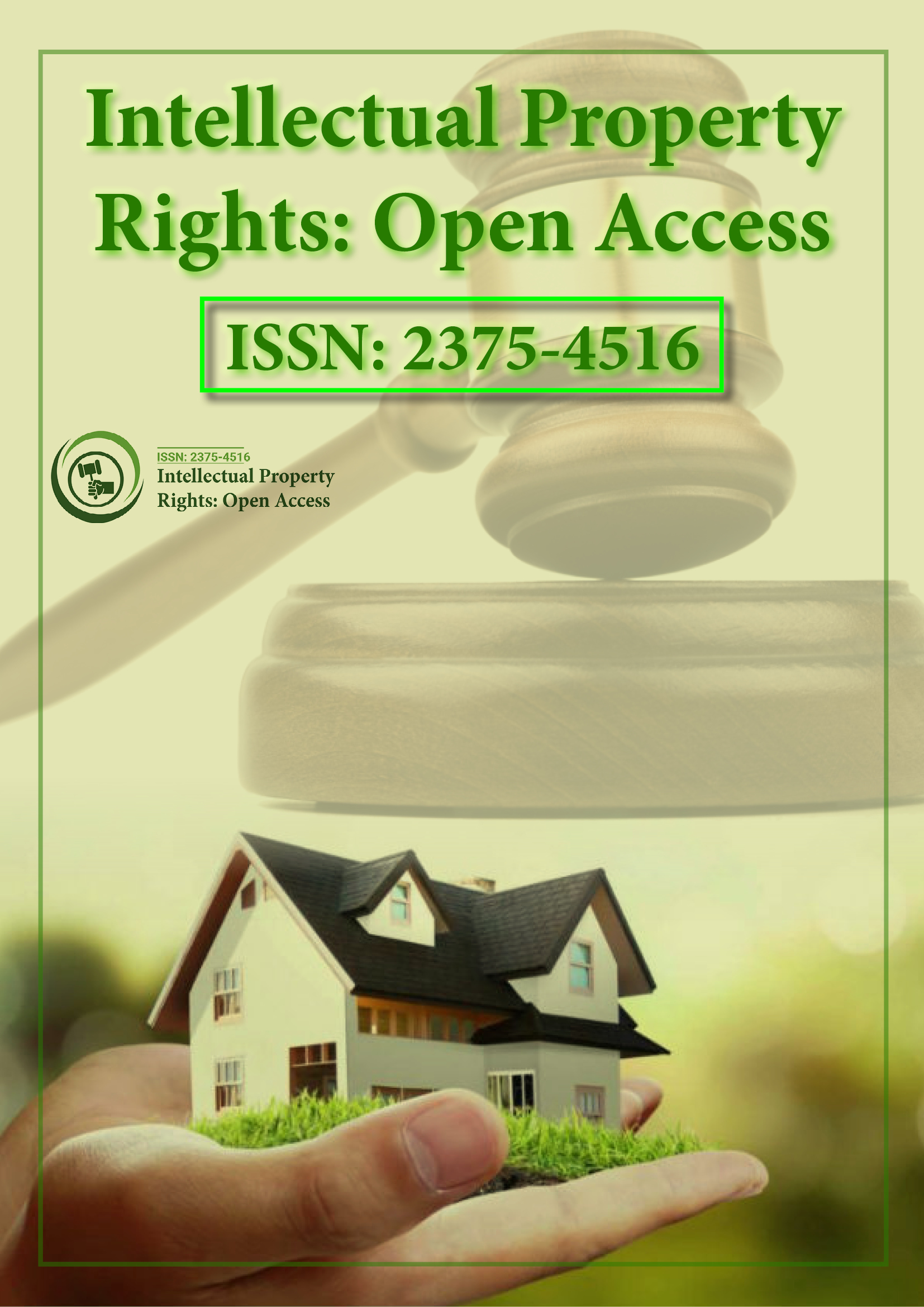Indexed In
- Open J Gate
- RefSeek
- Hamdard University
- EBSCO A-Z
- OCLC- WorldCat
- SWB online catalog
- Publons
Useful Links
Share This Page
Journal Flyer

Open Access Journals
- Agri and Aquaculture
- Biochemistry
- Bioinformatics & Systems Biology
- Business & Management
- Chemistry
- Clinical Sciences
- Engineering
- Food & Nutrition
- General Science
- Genetics & Molecular Biology
- Immunology & Microbiology
- Medical Sciences
- Neuroscience & Psychology
- Nursing & Health Care
- Pharmaceutical Sciences
Commentary - (2023) Volume 11, Issue 4
Liberty and Innovation: Rethinking Intellectual Property Rights
Any Tapey*Received: 24-Nov-2023, Manuscript No. IPR-23-24063; Editor assigned: 27-Nov-2023, Pre QC No. IPR-23-24063 (PQ); Reviewed: 12-Dec-2023, QC No. IPR-23-24063; Revised: 19-Dec-2023, Manuscript No. IPR-23-24063 (R); Published: 26-Dec-2023, DOI: 10.35248/2375-4516.23.11.250
Description
In the scope of intellectual property, the libertarian perspective presents a nuanced stance that challenges traditional notions of property rights and government intervention. Libertarians, guided by principles of individual freedom, limited government, and free-market capitalism, advocate for minimal restrictions on Intellectual Property (IP) rights. This viewpoint raises pertinent questions regarding the nature of ideas, innovation, and the role of government in regulating creative works.
At the core of the libertarian argument lies the belief that ideas and intellectual creations are fundamentally different from tangible property. While physical property is scarce and subject to exclusive ownership, ideas are non-rivalrous and non-exclusive. Libertarians argue that attempting to treat ideas as property introduces artificial scarcity, hindering innovation and impeding the natural flow of knowledge and creativity.
From a libertarian standpoint, enforcing strict intellectual property laws contradicts the principles of free markets and individual liberty. Patents and copyrights, which grant monopolies over ideas for a specified duration, are seen as government-granted privileges that restrict competition and impede technological progress. Libertarians argue that such monopolies stifle innovation by inhibiting the free exchange of ideas, limiting the ability of individuals and businesses to build upon existing knowledge and create new products or technologies.
Moreover, libertarians question the moral legitimacy of using state-enforced laws to protect intellectual property. They argue that these laws often infringe upon individual liberties by restricting the freedom of expression and impeding the dissemination of knowledge. For instance, copyright laws that limit the sharing or modification of creative works on digital platforms can be seen as a form of censorship and a violation of individuals' rights to freely engage with and transform cultural content.
Additionally, libertarians highlight the potential for abuse and manipulation within the current intellectual property framework.
Large corporations, they argue, can exploit patents and copyrights to stifle competition, maintain market dominance, and engage in "patent trolling" using patents not for innovation but as a tool for litigation and profit-seeking. This behavior goes against the principles of free-market competition that libertarians champion.
Instead of relying on government-granted monopolies, libertarians propose alternative mechanisms to encourage innovation and creativity in a free-market framework. They advocate for contractual agreements, trade secrets, and reputation-based systems as viable alternatives to protect intellectual creations. These mechanisms, they argue, allow for voluntary agreements between creators and users, fostering innovation without the need for state intervention.
Furthermore, libertarians emphasize the importance of a robust public domain a scope where ideas and knowledge are free from IP restrictions. They argue that a thriving public domain is essential for the advancement of society, enabling the unrestricted sharing and adaptation of ideas that can lead to further innovation and cultural progress.
However, critics of the libertarian stance on intellectual property raise valid concerns regarding the potential consequences of minimal IP protections. They argue that without adequate incentives to protect intellectual creations, innovation might suffer, leading to reduced investments in research and development. Moreover, they contend that weaker IP protections could undermine creators' ability to benefit from their work, potentially discouraging future innovation.
To reconcile these perspectives, a balanced approach that considers both the incentives for innovation and the promotion of knowledge dissemination becomes vital. Finding a middle ground that fosters innovation while ensuring reasonable access to ideas and creative works remains a persistent challenge.
Conclusion
In conclusion, libertarian perspectives on intellectual property challenge the conventional notions of patents, copyrights, and government intervention in regulating ideas. Emphasizing individual freedom, free markets, and the limitations of treating ideas as property, libertarians advocate for minimal restrictions on intellectual creations. While raising critical questions about the balance between incentivizing innovation and ensuring access to knowledge, these perspectives contribute to the ongoing discourse surrounding the role of intellectual property in fostering innovation and societal progress.
Citation: Tapey A (2023) Liberty and Innovation: Rethinking Intellectual Property Rights. Intel Prop Rights. 11:250.
Copyright: © 2023 Tapey A. This is an open access article distributed under the terms of the Creative Commons Attribution License, which permits unrestricted use, distribution, and reproduction in any medium, provided the original author and source are credited.
